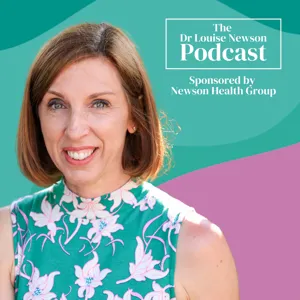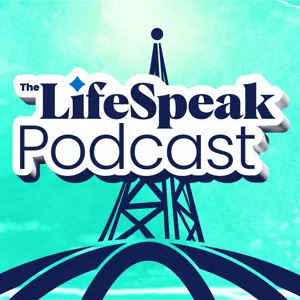Podcast Summary
Menopause and Addictions: A Hidden Connection: Menopause and perimenopause can lead to addictive behaviors, including substance abuse, due to uncomfortable symptoms. Seek help and support to address both hormonal imbalances and addictive tendencies.
Menopause and perimenopause can lead to various addictions, including substance abuse, due to the uncomfortable symptoms women experience. Dr. Louise Newson, a GP and menopause specialist, shares this insight from her podcast where she interviews Alex Newman, a substance misuse therapist. Alex, who developed her skills over 25 years, shares her personal experience of struggling with her own perimenopause and how it affected her career and led her back to her passion of helping women deal with addiction and anxiety. Dr. Newson emphasizes that many women don't realize the connection between their hormonal changes and their addictive behaviors. Alex adds that she has seen a pattern of addictions resurfacing during perimenopause. Both women encourage women to seek help and support during this stage of life to address both hormonal imbalances and addictive tendencies.
Overlooked hormonal imbalances in women: Trust intuition, educate self, seek specialized care for hormonal issues, and avoid coping mechanisms like alcohol or drugs.
Women's hormonal imbalances can be overlooked by healthcare professionals, leading to misdiagnosis and unnecessary suffering. The speaker shared her personal experience of being diagnosed with various conditions for three years before discovering her hormonal issues. She emphasized the importance of trusting one's intuition and advocated for women to educate themselves about their bodies and hormones. The speaker also mentioned the potential for women to turn to substances like alcohol or drugs in an attempt to cope with their symptoms, which can further complicate their health issues. Ultimately, she urged women to seek out specialized endocrine doctors and to be persistent in advocating for their health.
Perimenopause and Substance Misuse: Root Causes and Solutions: During perimenopause, women may turn to substances due to unresolved trauma and anxiety. Evidence-based treatments like hormone replacement therapy are often inaccessible, leading to addiction and worsening mental health. Holistic solutions addressing underlying issues can help women manage symptoms effectively and non-addictively.
During the perimenopausal stage, many women experience various symptoms that can lead them to turn to substances like drugs, alcohol, or even prescription medication. Sadly, evidence-based treatments, such as hormone replacement therapy, are often not accessible to these women. Instead, they may be offered antidepressants or other non-beneficial solutions. This can result in addiction and worsening mental health issues, particularly during times of stress like the Covid-19 pandemic. It's crucial to recognize the root causes of substance misuse, including unresolved trauma and anxiety, and offer holistic solutions that address these underlying issues. By raising awareness and providing resources, we can help women find effective and non-addictive ways to manage their perimenopausal symptoms.
Hormonal imbalances during menopause can lead to anxiety, depression, and addictive behaviors: Recognize hormonal imbalances during menopause as a potential cause of mental health symptoms and provide women with resources and support to manage their symptoms and maintain overall wellbeing.
During the perimenopause and menopause, many women experience hormonal imbalances that can lead to increased anxiety, depression, and addictive behaviors as they struggle to find ways to cope with these new feelings. This can result in a downward spiral, where trivial worries become magnified and women may turn to substances or other unhealthy habits to try and alleviate their symptoms. Unfortunately, due to societal stigmas and a lack of awareness, many women do not recognize that these issues are related to their hormonal changes and instead blame themselves or hide their struggles. It is essential that healthcare providers and society as a whole recognize the connection between hormonal imbalances and mental health symptoms during this stage of life, and provide women with appropriate resources and support to help them manage their symptoms and maintain their overall wellbeing.
Menopause, Hormonal Imbalance, and Substance Misuse: Historically, addictive menopause meds may contribute to substance use disorders. Long-term antidepressant use during menopause can lead to osteoporosis. Women struggling with substance misuse during menopause face limited resources and lack of awareness. Hormone Replacement Therapy can help alleviate symptoms and reduce substance use.
There is a significant connection between menopause, hormonal imbalance, and substance misuse, particularly with regards to alcohol and prescription drugs. Historically, women have been given addictive medications to manage their menopause symptoms, which may have contributed to the development of substance use disorders. Furthermore, long-term use of antidepressants, which are commonly prescribed during menopause, can lead to osteoporosis, a condition that is more prevalent during menopause. Women struggling with substance misuse during menopause often find it difficult to access the help they need due to limited resources and lack of awareness about the connection between menopause and substance use. Hormone Replacement Therapy (HRT) can be an effective solution for some women, as it can help alleviate menopause symptoms and improve mood, potentially reducing the need for substances. Overall, it is crucial to raise awareness about the link between menopause and substance misuse and provide adequate resources and support for women during this transition.
HRT not entirely addictive: HRT can reduce cardiovascular disease and osteoporosis risks, benefits vs risks should guide usage, and individual circumstances matter
The stigma surrounding hormone replacement therapy (HRT) being addictive is not entirely accurate. HRT is not like addictions to substances that are harmful in the long term. Instead, HRT can provide numerous benefits for women, including reducing the risk of cardiovascular disease and osteoporosis. The decision to continue taking HRT should be based on individual circumstances and the ongoing assessment of benefits versus risks. The negative connotations associated with the word "addiction" should not overshadow the potential positive aspects of taking HRT. Ultimately, it is essential to approach HRT holistically and consider the unique needs and circumstances of each individual.
Understanding the whole person: When working with individuals dealing with substance use or other challenges, it's essential to consider their whole person and not just the problem. Address underlying causes, traumas, and hormonal effects for effective care.
When working with individuals dealing with substance use or other challenges, it's crucial to consider the whole person and not just the problem. As a healthcare professional, it's essential to understand the underlying causes and traumas that may be contributing to their behavior. Women, particularly during perimenopause, may be more susceptible to triggers and making uncharacteristic decisions. Substance abuse can lead to an earlier menopause and more severe symptoms, and it's important to address both the abuse and its hormonal effects. Additionally, some women may experience PMS or PMDD, leading them to use substances more during those times. It's essential to approach individuals with empathy and understanding, addressing all aspects of their lives to provide effective and comprehensive care.
Aging bodies struggle with alcohol and drugs during perimenopause, leading to a vicious cycle of exacerbated symptoms and increased dependence.: As we age, especially during perimenopause, our bodies become less tolerant of substances like alcohol and drugs, leading to potential health risks and addiction. Keep a drink diary, seek support, and practice self-care to make positive changes.
As we age, our bodies become less able to tolerate substances like alcohol and drugs, especially during perimenopause. This can lead to a vicious cycle of exacerbated symptoms and increased dependence. The similarities between the symptoms of a hangover and perimenopause are striking, and ignoring the body's signals can lead to long-term health consequences. Additionally, processed foods can also be addictive and detrimental to our health. If you suspect you or someone you know may be struggling with substance use or addiction, the first step is to keep a drink diary to gain awareness of your consumption. Other tips include seeking support from trusted friends or professionals and practicing self-care through healthy habits and mindfulness. Remember, you're not alone, and acknowledging the problem is the first step towards making positive changes.
Track daily drinking habits and correlate with symptoms to identify patterns and potential triggers: Self-reflection, record-keeping, understanding alcohol units, seeking support, and finding alternatives can help manage problematic alcohol consumption.
Recognizing and addressing problematic alcohol consumption involves self-reflection and record-keeping. By tracking daily drinking habits and correlating them with symptoms, individuals can identify patterns and potential triggers. Understanding the concept of alcohol units can help provide clarity on actual consumption levels. Lastly, seeking support from friends, healthcare professionals, or support groups, and finding alternative activities to drinking, can all contribute to managing alcohol use. Remember, acknowledging a problem and taking proactive steps is essential. For more information, visit Newson Health Group's website and download their free Balance app.





